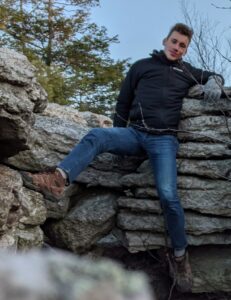Sam Arnold, Environmental Science and Government & Law ’22
 My interest in environmental science began with my childhood vacations and excursions into the various natural areas and parks near where I live in eastern Pennsylvania. I was always captivated by the natural world with its diverse inhabitants and unique structures. This interest developed throughout my early education as my grade school engaged in various outdoor programs offered by local environmental organizations like the Lehigh Gap Nature Centre. I had a wonderful opportunity growing up to see the progress that particular organization was making turning a barren superfund site into a conservation preserve. In high school, I further developed my passion for environmental science, but also became more aware of the interdisciplinary nature of field. Environmental science is unique among the natural sciences in that its topics often heavily incorporate the influence of human social systems. For that reason, I chose to study political science and economics in college in addition to the traditional disciplines of environmental science.
My interest in environmental science began with my childhood vacations and excursions into the various natural areas and parks near where I live in eastern Pennsylvania. I was always captivated by the natural world with its diverse inhabitants and unique structures. This interest developed throughout my early education as my grade school engaged in various outdoor programs offered by local environmental organizations like the Lehigh Gap Nature Centre. I had a wonderful opportunity growing up to see the progress that particular organization was making turning a barren superfund site into a conservation preserve. In high school, I further developed my passion for environmental science, but also became more aware of the interdisciplinary nature of field. Environmental science is unique among the natural sciences in that its topics often heavily incorporate the influence of human social systems. For that reason, I chose to study political science and economics in college in addition to the traditional disciplines of environmental science.
My goal at Lafayette is to prepare myself for a career in ecological research and environmental activism. I plan to use the knowledge and experiences of my environmental science degree to study conservation biology and ecology as they relate to birds, reptiles, pollinators, or other species that act as indicators of ecosystem health. I plan to use the knowledge and experiences of my government and law degree to understand how my environmental science interests relate to political systems, and to affect positive change in those systems. This understanding could make me qualified to help draft or implement governmental and corporate policies that significantly affect ecosystems and the species I want to study. I may also have a unique awareness of the many complex factors affecting environmental health, such as business interests or the presence of socioeconomic inequality, that would help me to more successfully pursue political changes necessary for a healthy environment.
I began my academic journey at Lafayette by a number of classes related to both of my degree programs. I used the research opportunities present in my political science classes to study how political institutions interact with environmental health. For example, I wrote a lengthy paper analyzing how federalism in the United States influences nonpoint-source water pollution policy. Within the environmental science discipline, I decided to focus on ecology and geology rather than the microbiology, chemistry, or engineering disciplines Lafayette also offers. I also am focusing on ecology in my independent pursuits. For example, I have been in the process of designing and building a pollinator and ecological education garden at Lafayette for the past few years, though COVID has delayed the building part for over a year so far. I participated in an academic internship in the Spring of 2021 wherein I researched and designed a riparian ecosystem zone along the nearby Bushkill Creek where there is a dam removal project. I plan to participate in a similar internship in the Fall, in which I will research and analyze the population trends of non-raptor avian migrants for Hawk Mountain Sanctuary. Over the Summer of 2021, I participated in my first internship program outside of Lafayette at the same Hawk Mountain where I was able to help with broadwing and kestrel research.
This fall, I will finish the requirements for both degrees at Lafayette. I plan to stay one more semester, though, to hopefully study abroad in southern France so I can finish a French minor and study the ecology of a very different area. My immediate plans following graduation are to attend graduate school to pursue a PhD in biology or ecology, where I would study species like birds that act as indicators of ecosystem health. After that, I hope to continue whatever research I end up pursuing, as well as make a meaningful effort to affect positive change for the environment at a local and potentially higher governmental level. I hope my unique background in the social sciences will enable me to better understand environmental issues I am passionate about, and help me to better affect that positive change.